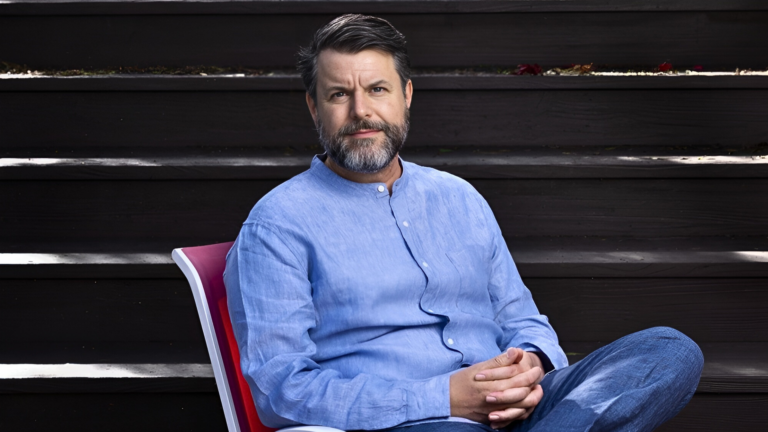This week’s conversation is with Dr. Mike Rucker, an organizational psychologist, behavioral scientist, and charter member of the International Positive Psychology Association. I’ve had the pleasure of knowing Mike for about two decades and I’m stoked to introduce you to him and his work.
A former corporate executive, Mike found himself burnt out, unfulfilled in his career, and as he states “over-optimized in the pursuit of happiness”. So, he decided to make a change. He quit his job and set out on a journey to rediscover the joy of play and fun – and to help others do the same.
Mike’s research and ideas about the science of fun have been featured in The Wall Street Journal, Washington Post, Fast Company, Psychology Today, Forbes, Vox, Thrive Global, Mindful, mindbodygreen, and more.
This January, Mike will be publishing his first book, The Fun Habit, an action-based approach that helps you critically examine your pursuit of happiness and make adjustments using evidence-based practices to invite more fun and joy in your life.
This is a fun conversation, about fun – how we can invite more of it into our lives, and why it is an essential piece to high performance, corporate cultures, and a life well-lived.
“When you’re finding ways to feel pleasurable about how you interact in the world and have fun, that allows you to then spread that feeling through social contagion to others that you love.”
In This Episode:
Pursuing happiness made him miserable
I like system design thinking and so up until that point, I had used all of these tools from psychology and the quantified self movement to really almost over-optimize my life. And that’s easy to say in the rear view mirror, but at the time it seemed like I had everything. I kept trying to use all these tools that had been helpful before to will myself to be happy because I thought that was possible. And, paradoxically, the more that I tried to figure out how to be happy, I was becoming miserable. Long story short, serendipitously around that same time, there was a lot of research suggesting that I wasn’t the only one. That this western pursuit of happiness was leading not just to despair, but to mental illness.
An infinite loop of despair
Those that are overly concerned about why am I not happy or I want to be happy more, and are kind of stuck in that introspection. And it becomes this sort of infinite loop of despair, where you see where want to be out there in the horizon, you identify where you are, and because of that distance it starts to bleed into your identity that you’re unhappy because happiness is way off, somewhere else.
The shift in approach to happiness
I started going down the rabbit holes of taking a more action- oriented approach to starting to index pleasurable experiences, and not necessarily having to identify with the emotion of happiness, or joy, or delight, but really having delightful experiences.
Valence
It essentially means if you’re on the positive side, you’re enjoying your activity, and if you’re on the negative side, you’re not enjoying it. And so it’s not necessarily tied to emotion. Emotion has those components, but you can look at it as just a spectrum and then arousal tends to be what’s unique with regards to our preferences. But for the most part, valance is universal. We either know that we’re enjoying our time or we’re not. And so, for me, it was, “Okay, how do I get out of this malaise and still use the agency and autonomy that I have to be able to create instances where I’m enjoying the time that I’m spending, rather than being in rumination?”
Autonomy rather than conquering
Understanding that a lot of what we are trying to do, especially in this place of success, is to regain autonomy over our domain, not necessarily conquer. And so I think that subtle shift, too, allowed me to sort of redistribute the rules. Because if you’re trying to conquer, which sometimes we’re led in that direction, but that’s not necessarily what we desire. At least in my experience, when you talk to folks, it’s really that they want to gain more of that autonomy but that they’re sort of led in the wrong direction.
Live YOUR way
There’s all sorts of metaphors where there is this path, there’s this game plan that’s given to you and if you execute it flawlessly, you’re going to get to the promised land. Yet there’s always alternative paths that we don’t have access to, unless we kind of step back and go, “Wow, I don’t necessarily need to play by the rules or what’s being prescribed”… it’s deciding what is it that actually I feel connected to. So rather than just chasing a version of success that’s been fed to me, figuring out, okay, what is it that’s really going to make me feel alive and play with that, so that my connection to something isn’t fed to me externally.
Fun is contagious
When you’re finding ways to feel pleasurable about how you interact in the world, that allows you to then spread that feeling through social contagion to the others that you love. And so for me, I think there is some sharp teeth to it. You could certainly be hedonistic and not have a sense of wanting others to thrive and be an awful person. But that’s not part of my DNA. But what I have found is that people that are devoid of these types of good times within their life, whether that be a mom, whether that be a leader within an organization, that ends up to be a top- down approach where everyone within that social circle starts to feel awful.
“Time poverty”
There’s this term that’s emerged in recent research called time poverty. And especially here in the United States, we know that for a majority of folks, that’s a true phenomenon, that affluence up to a certain point, we know, I think the latest measure is $125,000. Excuse me. Yeah, 125,000 with regards to personal salary. After that you don’t really get happier the more affluent you are. But what we do know is that people that are time poor tend to be some of the most unhappy people because again, it goes back to social determination theory where once we begin to lose that autonomy, and it happens slowly over time, it’s this sort of compound effect. So you don’t understand death by a thousand cuts that it’s happening to you. And everyone’s experience is going to be different with regards to what they feel a sense of duty to. But we just allow our lives to sort of habituate. And then the spaces in between, we try to pacify negative valence through things that aren’t really fun, but we are tricked to believe they’re fun.
Autonomy and optimism generate happiness
I never villainize optimism. In fact, I would say that optimism is a byproduct of going through the exercises that we’ve discussed this far. I meant once you understand that you can take ownership of at least part of your day, that’s when you start to see the world through a lens that I have control and I can create moments of joy essentially on demand. And that creates a very optimistic space.
Having fun in parenting
Parenting in the context of fun, there’s sort of two rules that I see. One is if you’re trying to have fun with your child, you really need to let the child lead. And so in that instance, what’s fun for him is not fun for you. So maybe there’s another opportunity. And then the second is it’s not fun if you’re not both having fun.
The map is not the territory
What often happens a lot where if we feel like there have to be bumper rails on what we do, we can’t really explore the territory. I love this saying that comes from science, that the map is not the territory. And where I think fun is really something that brings a lot to the table is that we really get to explore the territory, because the adults so often were kind of stuck in the map. I just want to get from here to there. And awe and wonder lives on the outside.
Is fostering fun at work a possibility?
For leaders in a work environment, it’s twofold. One, to what degree can you give autonomy to your individual employee? There was a great example … I don’t know if you saw what was trending on LinkedIn today, but essentially it was a French employee that sued his company because he was being told what to do after work what they believed was fun and he didn’t buy into their fun culture, which was essentially drinking and he won the case. So this idea of forced fun we now know is toxic, right? It’s essentially a component of toxic positivity. But when employees are allowed to have some autonomy over their domain so they can control how they engage in their work so they can create it to be as pleasurable as they want, they have free time over their breaks so that they can engage in pleasurable activities when they control their time, so their lunch hour, they’re really allowed to do what they want to do, these things all bring vitality back into the workplace.
Burnout is detrimental to fun and productivity
When people don’t have enough energy, because they’re so burnt out about what they do within their work environment and there’s no empathy about that, they come home and they crash and ultimately that becomes a downward spiral. And so there’s a host of research that backs us up. And for me I studied the most in medicine. For doctors that are burned out, we know that they lose empathy. And once you lose empathy, that correlates highly with patient outcomes.
Forced fun isn’t fun
Creating an environment where people can thrive. So not necessarily how do we make work fun through forced fun because that never is fun. So there’s the paradox. If you try and organize something that’s not inclusive, that’s not co-created with your employees, nine times out of 10, it’s going to backfire. Sometimes it’s going to be amazing because you got lucky and everyone enjoyed it and they’re like wow. But for the most part, forced fun tends to be counterproductive.
Psychological safety, then fun
You got to start with psychological safety. You’ve got to do the work. People need to feel comfortable with each other and know what their limits are so that you can begin to integrate what are the jokes that within this group dynamic are allowed to be told? And once you figure out what those bumper rails are, then you can start to play with it. And then you need buy-in from the group. I mean that’s just kind of common org psych knowledge is that what are the things that within this culture of this collective are going to be okay and what are not?


